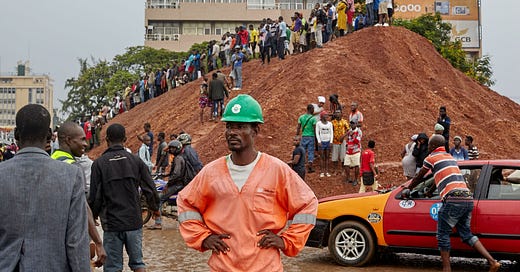Begin with the man in the grey suit, a ringed patch on his head. Then, turn to the other man in construction overalls, whose stance is not one of waiting but deliberation. He is thus key to meaning in the photograph, a sense that there are those who watch and others whose responsibility is to compose chaos into a pattern. Yet, it is the fact he stands outside the small hill—where a line of people turn sideways and form clusters—that makes him a man dealing with urgent concerns. As a final comparison, note the shoeless man who maneuvers a taxi: neither waiting nor deliberating, he makes a path along a distressed day.
Teresa Meka: “I love how photography brings people together.”
The photograph was made on the morning of June 5, 2015, in Accra (Kwame Nkrumah Circle), just a few meters away from the location where flood waters had caused a patrol station explosion the night before.
The next morning I set out trying to document the state of the place. The whole area was barricaded by security services. I chanced upon this scene of the many people that had come to view what had happened. I liked the scene and I made the photograph.
The photograph has more meaning now than when I made it because it captures the remnant of a tragic day in Accra and it's a reminder for me to continue to photograph, no matter what is happening.
My approach is that of a curious observer, documenting things around me. I often find deeper meaning in the photographs as I spend more time looking at them.
I love how photography brings people together; even without a deep visual understanding most people are able to appreciate photographs. It has been my way into people's lives and it has taken me places. At the same time it is my tool for self-expression: it gives me the opportunity to share my view of the world.
Two other photographs by Teresa Meka
Support Teresa Menka
Teresa Menka's work is a personal reflection; she creates and expresses herself through photography as a form of self-therapy. Her photographs are often humoristic and detail oriented. For her, photography is a process of questioning and self-discovery and a means to document her relationship with her environment and how that evolves with time. Find out more about her work via her website, Instagram, and African Women in Photography, which she belongs to as a member.
Last Week — Blessing Atas
I think photography is impactful in every way: it is a moment in time that is framed for a lifetime, and if it’s a great photograph, time after time it’s likely to bring the same emotions you felt when you first saw the photograph. Photography has saved me in so many ways. Being able to have a means to express yourself that people around you—and even across the world—can relate to is magical.
Read More: The Egrets
Support Tender Photo
This is the 34th edition of this publication. Every week I feature one photograph and the photographer who took it: you’d read a short caption from me, and a statement from the photographer. My goal is to set up conversations with the work of early to mid-career African photographers. If this newsletter was shared with you, consider subscribing, and if you have already subscribed, forward to a friend who loves photography.









“...a sense that there are those who watch and others whose responsibility is to compose chaos into a pattern.” This is the joy of the writer. Thank you for capturing it so well.